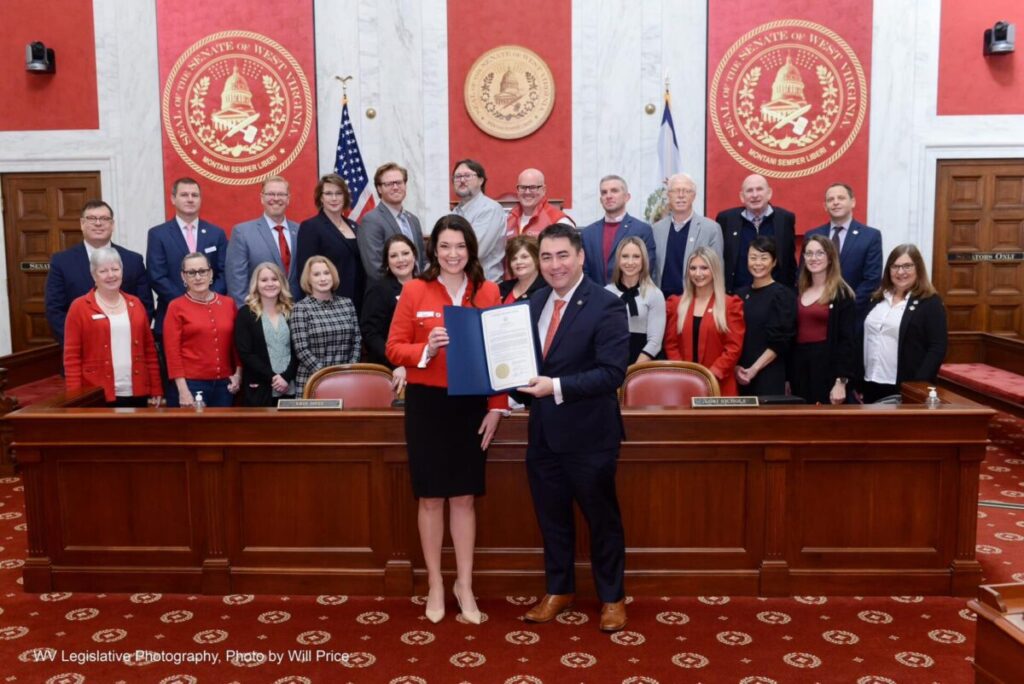The West Virginia Legislature recognized March as American Red Cross Month and the local region used Red Cross Day at the Capitol Wednesday as a chance to showcase the organization’s mission of saving lives through blood donations and the efforts of generous volunteers.
Erica Mani serves as chief executive officer for the Central Appalachia Region of the American Red Cross. She said the Senate’s resolution not only recognizes the organization’s mission, but the mission’s founder and first president, Clara Barton, who, in 1881, turned her focus to helping people recover from accidents or disasters.
“We are bringing awareness to our mission to prevent and alleviate human suffering in the face of emergencies,” Mani said. “We do that through our volunteers and through our generous donors.”
Multiple educational booths and tables lined the hallway outside the upper rotunda, all drawing attention to the organization’s annual Capitol Blood drive. The goal: inspiring people to give of their time, money or blood.
“We’re receiving donations of blood today and it is a critical part of our mission to make sure that lifesaving blood is on the shelves of our hospitals,” she said. “So our local community members who come out and do this are true heroes.”
Mani said just one donor donating one pint of blood can save three lives.
Red Cross volunteers provide disaster relief assistance and health safety training and can take on leadership positions in disaster response, mental and emotional health services, or work as community educators.
“Our goal is to make sure our communities are resilient, whether that is with the blood on the shelves, whether that is with trained individuals, lifesaving CPR and First Aid skills, or whether that is following a disaster which we see all the time on the news, the big tornados, hurricanes, wildfires,” she said. “But one of the things that is most common that we don’t see as much of is that the Red Cross is responding to home fires every day in our communities across this region.”
The Red Cross responds to about 1,200 disaster events each year. In the first two months of 2023 the organization helped more than 500 people, most of whom were affected by home fires.
That includes a large apartment fire in Charleston in January that several dozen residents displaced or homeless. The Red Cross jumped into action and has since re-housed every single person affected by the fire.
In addition to disaster aid, the Red Cross serves active duty military and their families, training and blood collection services, international services, and free home installation of fire alarms.
Blood collection and donation top their crisis-related services and blood donors are always in demand.
Jason Harshbarger serves on the board of directors with the Red Cross in West Virginia and is a regular blood donor.
“You know we take blood and life for granted and when you are on the receiving end of it or when you have a loved one who needs blood it’s very vital to have that blood donation,” Harshbarger said. “One blood donation will save three lives and also it’s a product we can’t manufacture, we cannot manufacture in the laboratory to save lives so we definitely need volunteers to donate blood for those lifesaving aspects for the Red Cross and also for family needs when you’re in that situation.”
Harshbarger said, during the pandemic, donations fell off but the Red Cross is now ramping up its efforts to encourage volunteers to donate blood.
“I just look at it this way, you never know when you’re going to be on the other end of an emergency surgery, a car accident, or a health issue,” he said. “So if I can save one life by donating blood once every 10-12 weeks, it really means a lot to me.”
The American Red Cross Central Appalachia Region serves 77 counties in West Virginia, Virginia, Maryland, Ohio and Kentucky.




















